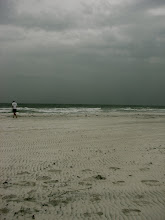Sounded like fun.
But what's a small drive uphill to Montanans is a bit different to a Chicago-born Illinoisan. That is, the road up the mountain was all dirt and narrow and steep and winding, with jaw-dropping drop-offs and Fru did not like it. I was driving my red Chevy pickup and was uneasy--though I'd lived in the mountains and mountainous areas at times, had driven dirt and gravel roads to Alaska, I was not quite used to these little Montana Forest Service Roads that were stitched to the rocky hillsides all over the state. It was a lot longer drive than the realtor lady had promised and I don't think we even made it halfway before Fru had had enough. We turned around in some precarious fashion and headed back to the cozy wooded comfort of our cabin.
So, later, I went by myself.
It was a weekend. It was sunny and mild and it must have been late September or early October. I made the winding drive up the mountain and came to the trailhead, where I parked. I'd brought along my small book bag backpack with my journal, a coke, a banana, a bologna and mustard sandwich, so that I could have lunch at the top of the peak. And off I went up the trail, hiking.
It was early to mid-morning and, though there were a few other people on the trail, I was mainly by myself. I hiked through the trees, bumbling along uphill and sidehill and switchback-hill, having a good time, wondering just how long a hike it was. The trail was narrow but well worn--easy to follow. I could tell I was getting closer, because the trees grew smaller, became more sparse (I could see the sky more often now) and then I reached a spot where it leveled off, but was still among the trees. There, a man stood and he was calling to some boys among the trees on the short slope below. I stopped to rest, said hello, and he replied with similar pleasantries. The boys came up the hill and the man said to me, "There's a couple of lakes down there. You can take a side trail if you want to see them." He pointed up the trail as he said it. "Okay," I said. "Thanks."
The man and boys left and I was alone again. I peered down the slope, thought I could see some water, more like ponds than actual lakes, but what the heck, I guessed I should go see them if they were that close. And I walked up the main trail a bit, but didn't really see a side trail. So, I took what looked kind of like a path and wandered downhill for a bit and sure enough, there were some pond/lakes, water caught in a crease in the mountainside among trees, water shallow and reedy, a place you'd expect to see a moose or something. But there was only me. And I was ready to get back to my climb to the peak.
But where was the trail?
Okay, I'd threaded my way down here, I thought, but had paid no attention to how I'd get back . . . I stood there for a while, in a quandary, then tried to retrace my steps from whence I'd come. But I was just wandering in the woods. And then it occurred to me that I was lost . . . Ahhh! Lost! . . . I became a little panicked, then more so as I stumbled about. What will I do? Where was I? What would happen and who would tell Fru? . . . That lasted, oh, maybe thirty seconds. Because I just as quickly realized that I wasn't lost. I was just being stupid. (It reminds me of a time when I was a kid and lived in Johnson City, Tennessee and I'd gone down to the creek to play in the winter and the creek was frozen over and I stepped out on the ice and the ice cracked, gave way, and I went plunging into the water, scared, helpless, except the water was about two feet deep and came only coldly up to my knees.) So I stopped myself and thought and told myself, all you have to do is angle uphill through the trees and you'll hit the main trail. So, I wasn't stupid because I got lost, I was stupid for thinking that I could get lost.
And I angled and climbed and found the trail and continued up it, finally getting past the treeline where the sun was out and it was strikingly beautiful. Then I made it to the peak, rocky and grassy (treeless) where there was a stout little forest fire lookout ranger station. I climbed that and had my lunch on its rustic veranda and you could see out over the other mountains: eastward down into the Bitterroot Valley and the smallish Sapphire Range, westward over the Bitterroots and into Idaho. Very nice.
On the hike back I came across quite a few people. At the trailhead I saw my landlord, Phil, and his little girl who was riding a pony. We said hello and he asked me how I liked the hike. I told him it was great. He said something to the effect that, it wasn't too much, kind of like a playground--here his little girl was going to ride her pony up it. I agreed--of course--I mean it's not like someone could get lost up there or anything.
